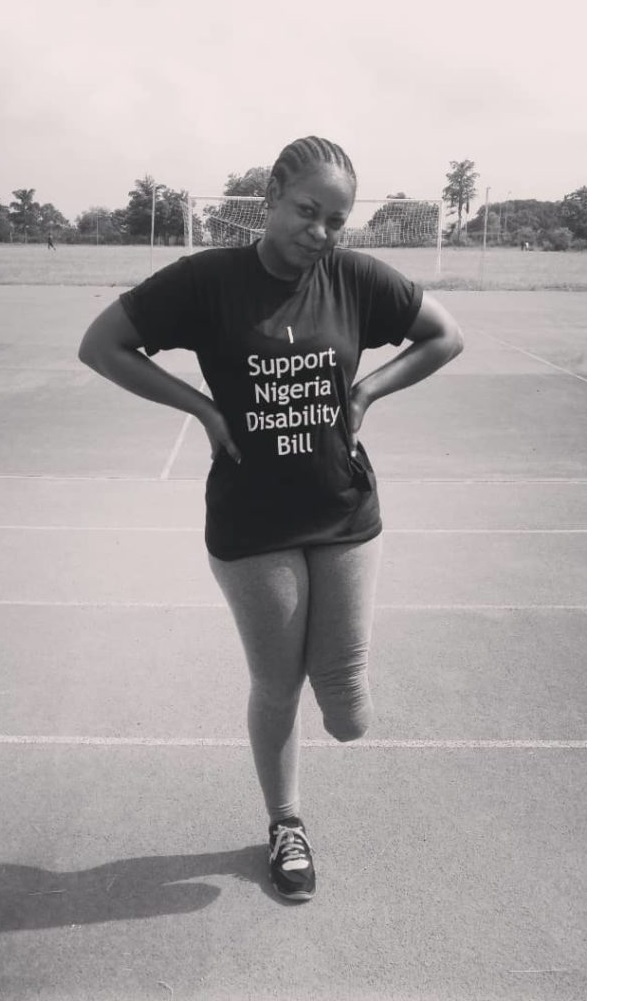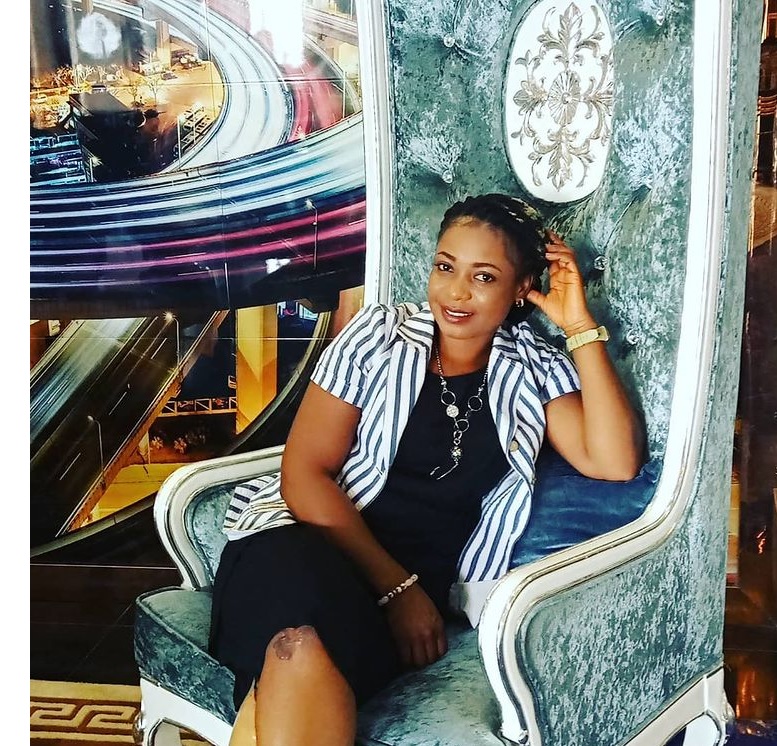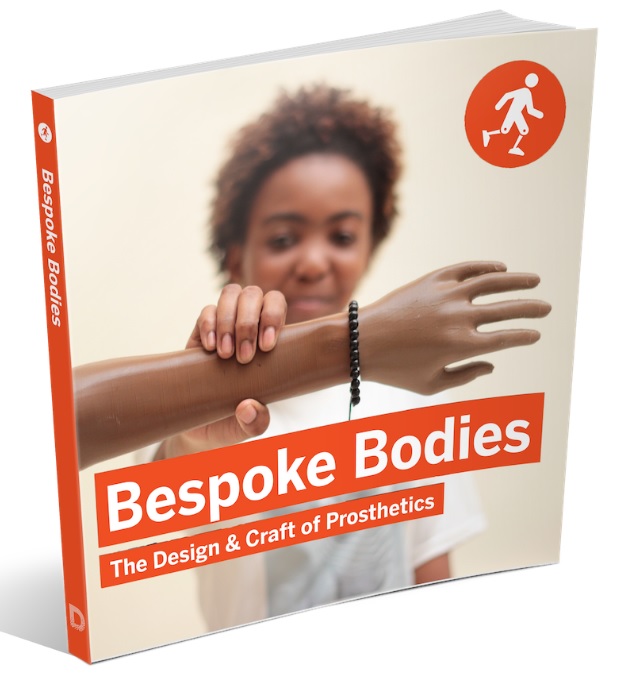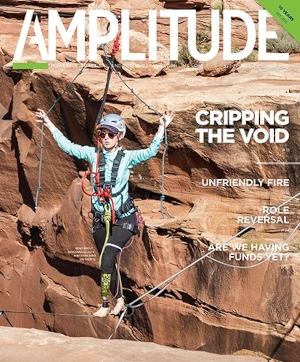
If Aver Akighir’s name sounds familiar, it’s because she made a cameo on our website last month as one of the bakers who shared a recipe in our Great Amputee Bake Off. But baking is a relatively small part of this Nigerian amputee’s life. In addition to operating her own cake and pastry shop, Akighir also hosts a weekly TV show about disability; sits on the Amputee Coalition of Nigeria‘s board; captains her country’s national amputee football team; and leads a mentoring program for young women with disabilities.
These endeavors and others have made Akighir a high-profile leader in the fight to end Nigeria’s longstanding pattern of discrimination against people with disabilities. Upon losing her left leg below the knee as a teenager in a 2003 accident, Akighir learned how cruel life can be for amputees in Nigeria, Africa’s most populous country (with more than 200 million inhabitants). She’s spent her entire adult life overcoming those challenges as an individual, while battling to change attitudes and laws that have not only permitted but encouraged discrimination against Nigerians with disabilities.
It’s the same struggle Americans with disabilities had to wage 30+ years ago, before passage of the Americans With Disabilities Act. Earlier this year, Nigeria finally approved its own disability rights law, and Akighir was right in the thick of the fight. We spoke with her about that landmark achievement, as well as her other work on behalf of amputees in Nigeria. Our conversation has been edited for clarity.
What are the biggest challenges for amputees in Nigeria?
There’s a shortage of services in all sectors of life. We don’t have any transport that is meant for people with disability. Somebody in a wheelchair, if you want to go from one corner of the town to another, sometimes you stay at the bus stop for over an hour, two hours. No taxi has the patience to stop and pick you up; they see you as wasting their time, because they will be the ones who will help you fold your wheelchair for you. There are not even ramps anywhere. Everywhere there are staircases. Imagine somebody trying to get around in a wheelchair, or even [walking] as an amputee.
The health care system here is very, very poor. There are no accommodations for amputees. We don’t have rehabilitation centers where, when you have an accident and it results in one form of disability or another, you can be rehabilitated for being integrated back into society. Everything is just left for you and your immediate family to push yourself back into society.

How did you overcome those challenges and limitations after you lost your leg?
One of the things that really helped me was my accepting my new self. I said, “OK, I am now am amputee. I now have a challenge. Do I still love myself? Do I still accept myself?” The moment I accepted that this is the new me, that was key. I was thinking, “Yes, the leg has been lost, but nothing has really changed. Everything I want to do, all the things I need to do, I can still do if I just put my mind to it.” Disability is just something of a mindset. It’s how you perceive yourself that determines if you are disabled.
I spent three months in the hospital. Nobody came to tell me, “OK Aver, when you leave the hospital, we’re here for you. You can come here and we’ll help you rehabilitate.” I saw a big gap in that aspect. I thought, “These services aren’t there, so how about I start being the service that persons with disabilities or amputees need.”
After the hospital and after recovery, eventually I went back to school. That’s when I got myself into the disability community in Nigeria. I’m relaxed whenever I’m around people with disabilities. It feels like a family. I feel like this is actually where I belong.
In the 17 years since your accident, has there been any improvement in services for amputees, or in recognition of persons with disabilities as equal members of society?
The ignorance of the government in terms of things that concern persons with disabilities feels very high, but we are making noise. We’re advocating for better health care services for ourselves. The [Discrimination Against Persons With] Disability Act was passed last January, and two or three months ago the president constituted the managing team of the Disability Commission. We are hoping that with the presence of the Disability Commission, things might get better. We know it’s a process. It’s not something that will happen in a day. But we advocated for the Disability Commission for like 19 years, and we finally have it. So we are hoping this will be a resource for all people with disabilities to use and advocate for other things that we need.
In terms of employment, too, employment is very hard for persons with disabilities. We find it very difficult getting employed, even though we are qualified. But the employers see us as not good enough for them to hire. We are hoping that change will happen soon.
Tell me about your TV show. That must be helping to raise awareness.
Possibilities TV is a program where we showcase the talents of people with disabilities, and we share their courage and inspiration. It is also a platform where friends and families of persons with disabilities come to share the stories of their loved ones. I discovered that a lot of persons with disabilities really want to be heard. They want to share their stories with the world. They want people to know what they have been through, and how they have managed to be where they are today, and how disability has affected their life, both negatively and positively.
Providing this platform for these people to air their voices was something novel. From the feedback we’ve been getting, the program has really touched people. It has been a wonderful, wonderful experience. [Possibilities TV isn’t currently available to US viewers, but Akighir is working to put it on YouTube. You can find a few snippets on Facebook; here’s one example.]
How did you have the resources to start a TV show? That’s not an inexpensive thing to do.
Wow, what a question! To be honest, I’m actually doing everything by myself, but I’m hoping that I’ll get a sponsor someday. The TV station has been so kind to me, but it has not been an easy journey. But it has been an interesting one, because it’s something I have passion for. No matter how difficult it might seem, I keep seeing myself doing this all over again. I didn’t give up on my dreams of being who I want to be and doing what I want to do.
What were your dreams before you were injured? Did you always plan to become a baker?
I have a passion for baking. I love baking. But initially I loved acting. I really wanted to be an actress. I have not achieved that yet, but I know I’m going to achieve it. It’s just a matter of time. Once the door opens, I know I will be there. So actually nothing really changed before and after the accident. The only thing I would say changed is that I have more energy now to do things, and to do them right.




